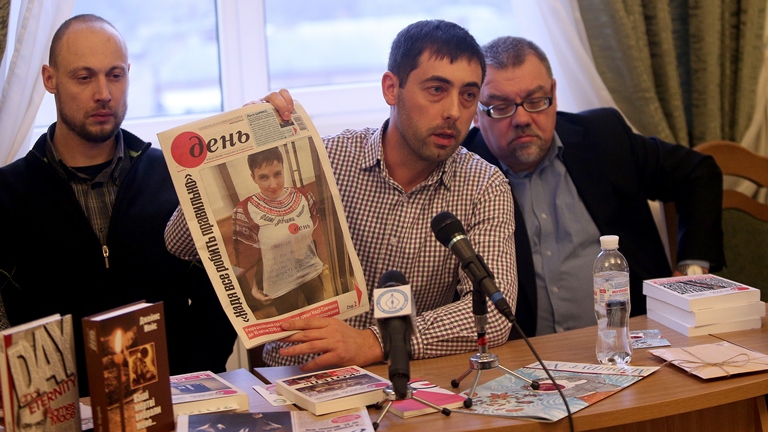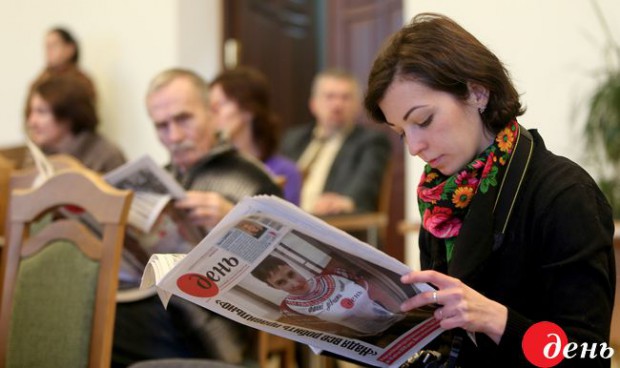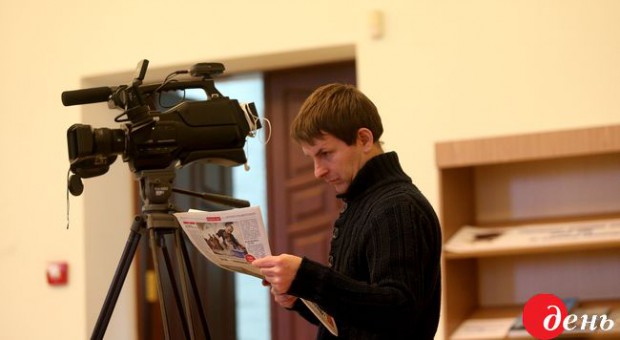“A lesson on true modern history”
A scientist from Mykolaiv: “Books of Den’s authors examine the times of what is now called Kuchmism, which led to terrible consequences”
Den’s intellectual “special operation” continues in Mykolaiv. Following the program at the local TAK TV on Friday morning and the opening ceremony of Den’s Photo Exhibition at the Old Fleet Barracks museum, the authors of the journalistic triptych of the “Contemporary History for Dummies” series – Ivan Kapsamun, Valentyn Torba, and Maria Semenchenko – met with local journalists and the public at the Oleksii Hmyriov Regional Universal Scientific Library. Also, the meeting was attended by Mykola Hrytsenko, president of the Charitable Foundation in Support of the Newspaper Den’s Initiatives and Oleksandr Pronkevych, scientist and director of the Institute for Philology of Petro Mohyla Black Sea State University, became the meeting’s moderator.
“Studying history, we usually consider the events that took place long ago,” started the conversation Pronkevych. “But who writes about recent history? Actually, it is journalists who do it. Den’s journalists let the present day pass through themselves and tried to understand it. This also applies to the three books of Den. The first book – ‘The Trap’ by Ivan Kapsamun – offers the look on our true history through the prism of Gongadze case; it outlines how the criminalized system we are now living in has been built. In general, the three Den’s books are interconnected – they return to the days far from present time – to the 1990s, to the formation of the system that has later become known as Kuchmism, which led to terrible consequences today.”
So the moderator gave the first word to Ivan Kapsamun, author of “The Trap.” Editor of Den’s Politics section told the true story of the clan-oligarchic system’s birth in Ukraine and discussed the outspoken case of Gongadze-Podolsky, to which he has devoted several years’ worth of work. His main theses are:
– “Newspaper Den is actively working with the community to revive the Ukrainian identity. We have a comprehensive approach to the history of Ukraine in order to have the society intellectually armed; without this it often makes wrong political choices.”
– “Our trilogy concerns the true modern history of Ukraine, which is seldom spoken about. One difference concerning the Russian leaders is that they study history, including that of Ukraine, and know what methods to use against us. But our leaders do not study our history, so it is difficult for them to resist this aggression. Plus, they have long ago become the junkies of corruption.”

– “Before Ilovaisk and Debaltseve encirclements, before the military tragedies that took hundreds and thousands of lives, there were ‘political traps,’ which we cannot escape from. ‘The Trap’ examines the events around the Gongadze-Podolsky case, but also describes how the ground was prepared for this triumph of impunity, which occurred in 2000. The ascension of Viktor Yushchenko in 2005 failed to break the system. The return of Viktor Yanukovych to power became the indicative signal of Yushchenko’s failure and the loss of the Orange Revolution.”
– “Unfortunately, the case of Gongadze-Podolsky has not yet been resolved; and as a result, we have Maidan, we have the war, we lost territory and thousands of people are killed. It’s the political consequences of those traps. Prosecutors, prime ministers, presidents change, but the system does not break, it adapts. This is the diagnosis of the condition Ukraine finds itself in.”
– “To get out of this difficult situation, we have to do everything to demonstrate our integrity. In our country today many people lack principles and character – this applies to politicians and journalists, and to society as a whole.”
The second book of the Den’s triptych is I, an Eyewitness by Valentyn Torba. Pronkevych presented it as follows: “This book is valuable because the author, having survived and rethought the tragedy in Donbas, has realized how the terrible situation that arose in Ukraine had been constructed and who had been its author. This is a book on anatomy of the situation.”
Valentyn Torba, the author of the book and Den’s journalist, said:
“In 1994 there was an attempt to occupy Crimea, which is often overlooked. But then the Alpha squad had arrived in Simferopol overnight. This is a response to the allegations that the government could do nothing in response to the occupation of the peninsula in 2014. No, they could, and there is an example to that. The same applies to Donbas.
“Putin was not going to squeeze us with tanks – it was extreme measures, because Ukrainians exceeded his expectations. He was just going to impose on us the idea of ‘the only brotherly people.’ But this is not the case of brotherhood or ethnicity, it is one of values. How can we live with a ‘brother’ who has been destroying us, who forbade Ukrainian language, and not since yesterday, but hundreds of years? How can you call this system of values a brotherly one if it is aimed at our elimination? Unfortunately, we were not prepared for this war, and if not for volunteer soldiers and frontline suppliers, whose appearance even Putin could not foresee, our fate would have been a very sad one. No one would have noticed as we were turned into another province.

“However, Putin will not attack us directly – it will be an attack to the rear, and the attack is already underway. And I was very sad when there are bottle flying in Verkhovna Rada, our leadership is suing each other, fighting on TV, and at the same time we are sitting on the ‘powder barrel.’ So, now everyone has to become the SBU, the counterintelligence, and the citizen to themselves. Perhaps then we will be more responsible when we vote.
“The laziness of thought ends in the loss of territories, the loss of one’s own home, and the great casualties of people.
“The war is very close, and we have to make our conclusions. These are not just any books, these are real handbooks. I would really like people to not simply read them – I would like them to be studied. My book came to me with a great cost – I lost everything in Luhansk, so I had a duty to write it.”
On the third book – Catastrophe and Triumph by Maria Semenchenko – Pronkevych said: “The Catastrophe and Triumph describes the tragic ordinariness that is made into the fate of heroes.”
Maria Semenchenko, editor of Den’s Society section, shared her thoughts with Mykolaiv public:
“Why the disaster? The book describes not so much military disasters, but rather political mistakes, the beginning of the occupation – the events that could have been avoided; but they happened nevertheless and it was a disaster. However, this led to the triumph. Unfortunately, it is only during the dramatic events – Maidan, the annexation of Crimea, the war – Ukrainians were able to discover themselves. Doctors, volunteers, soldiers – before all these events we did not know what we were capable of. As it was a triumph.
“War goes on for the second year and people get used to it; they return to their normal pace of life, especially in cities that are far from the explosions. Sometimes they even forget that there is a war. But after reading these stories, I hope, people will no longer perceive the war as something that is abstract and distant; as something that is not their own. The memory of the victims of war is very important, because we need to understand who protects us, it should never become a mere statistics for us.
“There has been a saying recently, that journalists who write a lot about Ukrainian soldiers are not doing proper journalism, but rather propaganda, calling them ‘Ukrainian heroes.’ I do not accept this position and I think that these stories need to be recorded, and we need to know who protects us.”
Author
Dmytro KryvtsunSection
Topic of the Day





